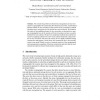Free Online Productivity Tools
i2Speak
i2Symbol
i2OCR
iTex2Img
iWeb2Print
iWeb2Shot
i2Type
iPdf2Split
iPdf2Merge
i2Bopomofo
i2Arabic
i2Style
i2Image
i2PDF
iLatex2Rtf
Sci2ools
107
click to vote
ESORICS
2006
Springer
2006
Springer
Secure Key-Updating for Lazy Revocation
Abstract. We consider the problem of efficient key management and user revocation in cryptographic file systems that allow shared access to files. A performanceefficient solution to user revocation in such systems is lazy revocation, a method that delays the re-encryption of a file until the next write to that file. We formalize the notion of key-updating schemes for lazy revocation, an abstraction to manage cryptographic keys in file systems with lazy revocation, and give a security definition for such schemes. We give two composition methods that combine two secure key-updating schemes into a new secure scheme that permits a larger number of user revocations. We prove the security of two slightly modified existing constructions and propose a novel binary tree construction that is also provably secure in our model. Finally, we give a systematic analysis of the computational and communication complexity of the three constructions and show that the novel construction improves the previo...
Related Content
| Added | 22 Aug 2010 |
| Updated | 22 Aug 2010 |
| Type | Conference |
| Year | 2006 |
| Where | ESORICS |
| Authors | Michael Backes, Christian Cachin, Alina Oprea |
Comments (0)

